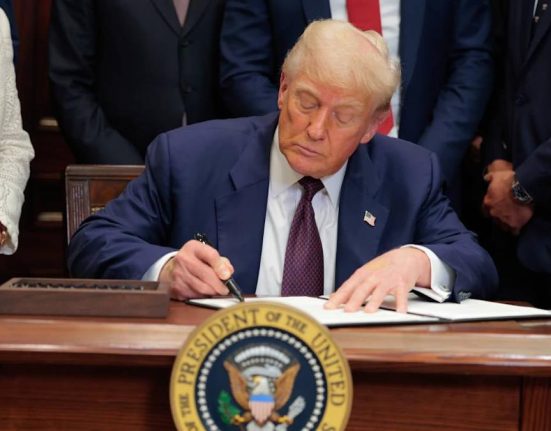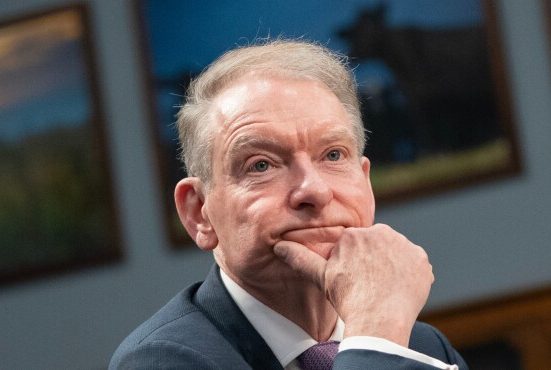Litigation risk for employers with a legal duty to monitor their employees’ 401(k) investments is set to hamper President
The US Labor Department is reversing Biden-era guidance that warned plans against digital currencies in workplace retirement portfolios. It’s part of a broader move by the White House to open 401(k)s to alternative assets like private equity, as Trump-backed businesses double down on Bitcoin.
Crypto assets make up less than 1% of the $9 trillion 401(k) market, which is usually solely concentrated in stocks and bonds. That proportion is unlikely to increase significantly with the rescission of the Biden guidance alone, since workers, not just the government, can also target employer plans over investments considered imprudent.
“There is still way too much uncertainty in the cryptocurrency market for plan fiduciaries to jump into this head first,” said Lisa M. Gomez, who oversaw DOL’s Employee Benefits Security Administration under former President
The revised guidance could prove marginally useful for financial firms seeking to tailor 401(k) products to self-directed brokerage windows or emerging securities rich in crypto-aligned tech ventures, but that’s unlikely to impact the average worker, benefits industry experts said.
“The menu of investment options will remain largely the same,” said Colleen Lamarre, a Pillsbury Winthrop Shaw Pittman LLP partner based in San Francisco and Silicon Valley. “Quite frankly, employees and participants weren’t necessarily requesting crypto assets to be included in plan investment menu lineups.”
The Trump administration didn’t immediately respond to request for comment on the Biden guidance rescission.
Fiduciary Dangers
Crypto detractors insist digital currencies are volatile, illiquid investments that suffer from a lack of transparency and oversight, particularly under an increasingly relaxed Trump-era regulatory regime.
The Securities and Exchange Commission dismissed a dozen cases against crypto companies since Inauguration Day. In April, Trump signed legislation to block an IRS rule that would have forced platforms to give them tax information on crypto trades.
Bitcoin reached an all-time high earlier this month at just over $100,000. The last sustained spike in value was in 2021, just months before the Biden administration issued its stark warning to 401(k) plans the Labor Department rescinded on May 28.
The intervening “crypto winter” saw consumer interest in retirement plan digital assets plummet—a clear sign that the few workers and retirees who want Bitcoin 401(k)s are “performance chasing,” a taboo strategy for most plan sponsors, said Keith Huber, vice president of OneDigital, an employee benefit adviser.
“The $TRUMP coin is another fantastic example of exactly what most plan sponsors fear about crypto,” he said. “It took off when the president announced it and then its value came crashing back to earth.”
Retirement plan decision-makers are held to a strict fiduciary standard under the Employee Retirement Income Security Act that requires them to loyally select and monitor prudent, diverse investments in the best interest of participants and beneficiaries—no one else.
Erratic price fluctuations and vague regulatory definitions common in the crypto industry could pave the way for workers to allege fiduciary violations if employers were to make digital assets more readily available to them.
Plan sponsors are already facing an onslaught of private-sector class actions for selecting funds that charge allegedly excessive fees and failing to adequately monitor third-party providers. Given the unpredictability around crypto, savvy plaintiffs attorneys are on the hunt for early 401(k) adopters, Huber said.
“The mere fact this DOL took this action will not insulate pension plan managers from liability for breaching those duties,” said Stephen Hall, legal director and securities specialist for consumer group Better Markets. “They would be well-advised to continue to exercise the ‘extreme care’” Biden’s guidance urged.
Brokerage Opportunities
EBSA’s guidance reversal may still open up some of the lucrative 401(k) market to crypto firms, mainly around the periphery of mainstay investment menus plan fiduciaries so closely guard.
Although rare, some 401(k) investors already access crypto through brokerage windows, a pass-through written into certain plans to the wider financial market. ForUsAll Inc. and Fidelity Investments, two 401(k) recordkeepers who embraced crypto trading early, adapted their products for brokerage window plans.
“A plan fiduciary that’s looking at crypto as an option is now free from repercussions and can look at it with two eyes open and see the diversification aspects of these products,” said Katherine Dowling, general counsel and chief compliance officer at Bitwise Asset Management, a US crypto money manager. “They can step lightly if they want to into products through brokerage accounts.”
The Biden-era guidance effectively banned crypto investments by threatening an “investigative program” targeting plan sponsors who adopted it, she said.
The notice decried crypto both in the 401(k) menu and through brokerage windows. This was a stark departure from the mutual understanding many plans thought they had with EBSA not to hold employers liable for the investments workers accessed outside their core lineup.
Another opportunity for growth is through public companies that load up on cryptocurrency assets so that equity in them comports to near dollar-for-dollar digital currency exposure. Around the time that Trump axed the Biden-era crypto guidance, the company behind his Truth Social social media app launched a stock sale to raise nearly $2.5 billion in capital and build a Bitcoin treasury of its own.
It’s too soon to tell, but digital asset treasury companies like what Trump Media & Technology Group Corp. appears to be building could be the cleanest way for institutional 401(k) investors to buy crypto shares, said Daniel Burdofsky, a Pillsbury partner in New York.
“We have an incredibly pro-crypto administration,” said OneDigital’s Huber. “We advise our clients to put together a diversified portfolio built around target date funds, managed accounts, you know? We like to stay on the cutting edge with our clients, but this is moving fast.”







